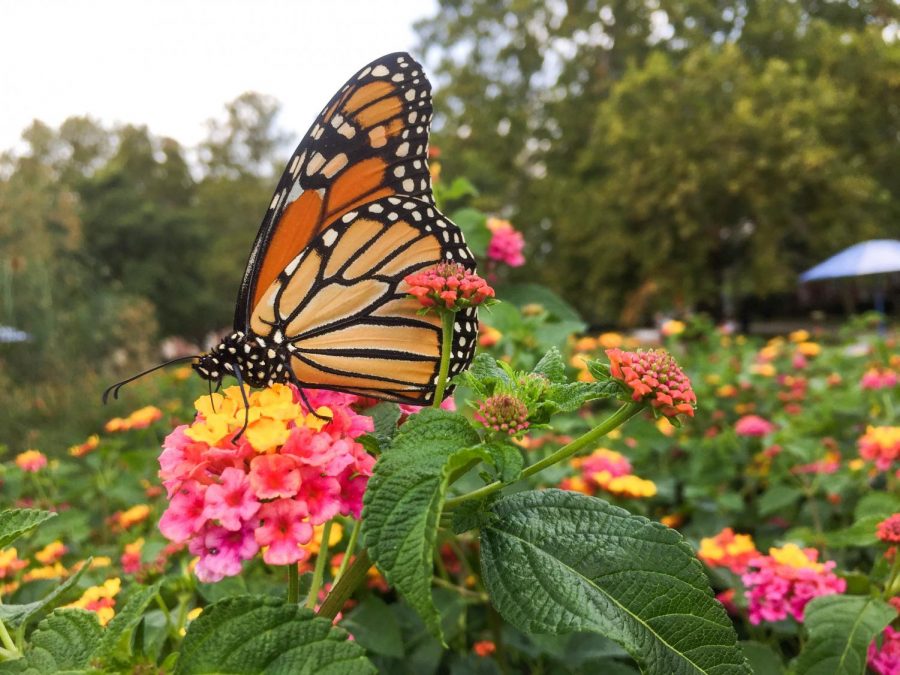Monarch butterflies migrate through Illinois
Sep 27, 2018
Observant students walking around campus lately may have noticed an abundance of black-and-orange monarch butterflies, which are passing through Champaign-Urbana on their annual fall migration to Mexico.
Sara Verma, sophomore in Education, said although she’s seen many butterflies in the garden outside the Krannert Museum, there are fewer this year than she remembers from last year.
According to the U.S. Fish & Wildlife Service, the North American monarch population plunged from an estimated one billion in the 1990s to a record low of 34 million in 2014. Since then, it has made a recovery to an estimated 109 million in 2017, according to the National Wildlife Federation.
Groups on campus and in the Champaign-Urbana community are working to preserve the shrinking monarch population.
Red Bison, a registered student organization focusing on ecological restoration, is part of the effort to protect and preserve habitats for pollinators and insects, such as monarchs. They plant wildflowers and native plants, which monarchs use as food sources.
Get The Daily Illini in your inbox!
The Anita Purves Nature Center, a facility under the Urbana Park District, provides educational programs and habitat gardens for monarch butterflies. Habitat gardens contain wildflowers and other beneficial plants, which attract and provide food and habitat for butterflies and other animals.
“We have lots of native plants here, and they’re all planted specifically for pollinators and other insects that can benefit from them,” said Savannah Donovan, environmental public program coordinator at Urbana Park District. “During the monarch migration, monarchs will expend a lot of energy. They’ll need places to stop where there are native plants, where they can drink nectar.”
The East Central Illinois Master Naturalist Program, sponsored by the University Extension, educates volunteers about a variety of conservation topics, including monarch butterflies, as well as their roles in the ecosystem.
Although monarch butterflies aren’t big pollinators themselves, Joseph Spencer, research scientist and insect behaviorist, said growing native plants that support monarchs is a good way to support other pollinators searching for pollen and nectar food sources.
One-third of the human diet is directly dependent on pollination; pollinators contribute at least $20 billion to the national economy and $200 billion to the global economy.
Human activities, including herbicide and pesticide use, changes in agricultural land usage, the increasing frequency of extreme weather events due to climate change and illegal deforestation all pose existential threats to the monarch migration, Spencer said.
“Monarchs are an insect whose biology is kind of butting into the consequences of human behavior,” he said.
Donovan said there are many ways students can make an impact despite the numerous factors that are in play.
She suggested planting native plants — especially milkweed and other nectar sources — to help pollinators and monarchs. There are national efforts and policies already in place to encourage farmers to set aside tracts of land for native species, as well as forming “no-mow zones” to protect habitats.
Ryan Pankau, University of Illinois Extension horticulture educator, said areas are being converted back into prairie and natural habitat, which was the original ecosystem throughout Illinois and much of the Midwest.
For students who don’t have a backyard to plant native plants, Pankau said volunteering with conservation efforts is a good way to get involved.
“Don’t think if you have zero experience doing conservation you can’t be a huge player as a volunteer,” said Pankau. “The younger generation is going to be vital.”






